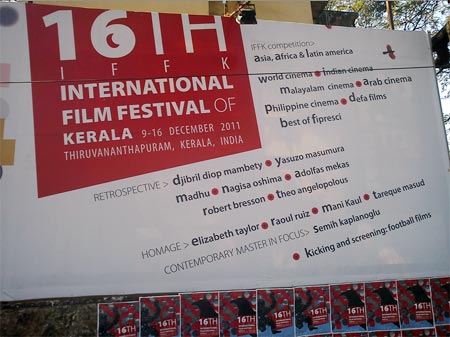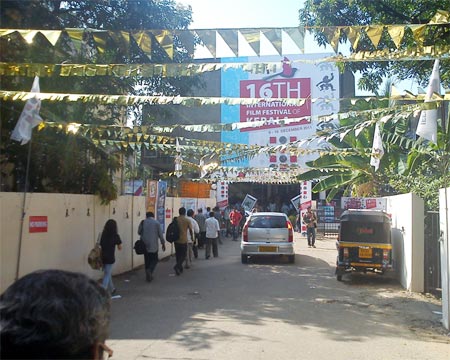Rajeev Srinivasan in Thiruvanathapuram
The 16th International Film Festival of Kerala will end on Friday, December 16. Check out Rajeev Srinivasan's lowdown at what happened at the festival.
It's becoming a bit of a pilgrimage in December in Kerala. On the one hand, you have black-clad Ayyappa devotees. On the other, you have throngs of film enthusiasts showing up. With good reason, too -- this is arguably the best film festival in India, with a good selection of films, with great diversity. Kudos is due to Bina Paul, who I understand curates the films.
This is the third year in a row that I have made it to the International Film Festival of Kerala in Trivandrum from December 9 to 16. Unfortunately, I have not been able to catch a whole lot of films, but what I did see was generally quite good.
I continue to be impressed by how well the IFFK is organised. It is a miracle that in Kerala, which is known for lackadaisical attitudes, this festival goes like clockwork. Once again, I had no trouble with my registration -- the same courteous and helpful Walter D'Cruz made sure it took me no more than five minutes to get my media pass, just as he had done in the last two years. Thank you, Walter!
The festival is a bargain for penurious cineastes, as you get, for some Rs 300, a pass that allows you to see all 200 films over the space of seven days. Of course, it would be physically impossible to see all of them, but if you wished, you could see five a day, if you rushed from one theatre to another, and you had tremendous stamina.
There was a bit of a brouhaha because the ticket had been upped to Rs 500, but -- does this remind you of anything else? -- the authorities 'rolled back' the rise.
In fact, that brings up an interesting question: Who funds this event? I couldn't really see a lot of sponsors (no ads for cellular companies or apparel companies or whoever else would like to reach the predominantly college-age crowd).
I suspect the impoverished Kerala government will not subsidise this event for long: It just doesn't have any money for much other than pension obligations. Despite the socialist attitudes, it might well be a good idea for the IFFK to become self-supporting.
The logistics of figuring out what movies to see when and where is quite formidable, but there is a well laid-out screening schedule that spans the 10 theatres and one open-air auditorium. You can reserve seats for a show on the Internet or via SMS -- but for no more than three films a day, which seems more than adequate. When you show up, they use a bar-code scanner to verify your reservation: Pretty high-tech.
So is the Web site (www.iffk.in) and this year's new technology, an Android app. Alas, it requires Android 2.2; I could not download it to my Android 2.1 phone, so I have no idea what it does.
The festival handbook is also very well-produced, a study in economy: Each film has a brief description in English and Malayalam, details of the director/actors, and which festivals it was shown at, and which awards it garnered. Short, simple, and enough to give one an idea of whether the film should be worth seeing. There is also more detail about the retrospectives, the in-focus countries, and so on. The show daily, an eight-page bilingual colour production, is also quite informative, especially about last-minute additions.
Please ...
Some of the venues were relatively empty
Image: The venue of IFFK 2011The handbook is organised along the lines of the themes of the festival. The handbook is available on the IFFK Web site, too, which is quite nice: You can figure out what you want to see even before you show up and pick up your kit.
This year, I noticed a few changes: For one, there wasn't a towering film personality to attract attention -- there was Werner Herzog and a slew of his films last year, and he was given the obviously well-deserved Lifetime Achievement award.
Bruce Beresford is there, and he is on the jury, but, as much as I loved Breaker Morant, it is not Fitzcarraldo.
Nor, for that matter, was there an obvious favorite film, as there was Biutiful last year with Javier Bardem, except perhaps A Separation (more about that later).
Besides, even though I heard there was record registration, I found some of the venues relatively empty. That, of course, may have to do with my personal choice of unpopular films, but there was a distinct reduction in the number of bujis (and bujinis) on offer -- you know, the bearded, be-kurta'ed and jhola-wielding variety of fans with the perpetually dyspeptic look.
Maybe IFFK is growing up, or the fans are getting less cynical.
In fact, this year, I also noticed there weren't that many 'socialist' movies -- although to be honest, the best film I saw in 2009 was the 1969 classic from Cuba, Memories of Underdevelopment. Maybe that's because the Marxists are no longer in power in Kerala.
Of course, this being Kerala, the virus of political conflict is rearing its ugly head here too. There was a fuss about a local director named Sherry not being able to show his film named Aadi-madhya-antam; he went on hunger strike and a bunch of left-wingers showed up in support.
Finally, he got his way. In a more alarming incident, a journalist named Shahina was apparently assaulted. Guys, leave those journos alone!
This year, there were several threads:
- World Cinema
- Indian Cinema
- Malayalam Cinema
- FIPRESCI choices
- 'Kicking & Screening Film Fest': Soccer films
- Arab Spring
- And, the best of the lot: The superb retrospectives, among which I liked:
- Yasuzo Osamura and Nagisa Oshima, great directors from Japan's New Wave
- Madhu, the Malayalam actor, with several beloved old classics:
- Chemmeen, Bhargavi Nilayam, Olavum Theeravum
I was intrigued by the Kicking & Screening film series, although I am not a particular fan of soccer: I personally prefer American football. I also quite enjoyed the twitter feed @KSFilmFest and the associated blog -- the person was quite thrilled at the reception his films got and the obvious interest of soccer.
I am a big fan of Japanese films; last year I was disappointed at missing Kenji Mizoguchi's film. And this year, I decided to see as many of the Osamura and Oshima films as I could, a decision I did not regret. I have only managed to see two: Masumura's 1961 A Wife Confesses and Oshima's The Burial of the Sun
In addition, I saw a lovely Iranian film, Nader and Simin: A Separation and, from Bangladesh, the 2002 film Clay Bird .
There were several other films, both in competition and outside, that I thought interesting, especially the FISPRESCI choices (that is, selected by film critics): The Salesman(Canada); The Monk (Spain/France); The Painting Lesson (Chile); The Dreams of Elibidi (Kenya); Black Blood(China); Of Gods and Men (France); Tomboy(France).
I missed Norwegian Wood, based on the book by the same name by Haruki Murakami, the celebrated Japanese author, whose elliptical prose I have enjoyed.
Speaking of classic books turned into film, I didn't see Chemmeen (by Thakazhi), Bhargavi Nilayam (by Vaikom Mohammed Basheer), both beloved in Malayalam, but I have seen them before.
There was also a remake of another Malayalam book/film classic, Yakshi (by Malayattoor Ramakrishnan) redone as Palas in Bloom.
I think I missed a couple of interesting films in Guerilla from Bangladesh on the 1971 war, and Sengadal from India/Sri anka, exploring the plight of Tamil refugees fleeing their genocidal war.
Also, I think Tahrir 2011: The Good, the Bad and the Politician would have been a good film with three shorts, but I didn't get a chance to see it.
Please ...
A Wife Confesses is a psychological thriller
Image: A scene from A Wife ConfessesSome brief reviews of the films I have seen:
A Wife Confesses, directed by Yasuzo Masumara, 1961.
Many of the old Japanese films I have seen have been very good -- yes, as the festival handbook says, there is more to it than Kurosawa (sort of like, yes, there is more to Indian films than Satyajit Ray or Bollywood).
This particular film, about the trial of a wife accused of letting her husband fall to his death during a mountain-climbing expedition, reminded me once again how well these old black and white films were made, and how very American-looking they are.
There is a very obvious influence of courtroom dramas and period pieces from Hollywood. There is a classic triangle: The woman did hate her loutish and abusive husband, and she was in love with the other climber, a young man who was much kinder to her.
But was she justified in cutting the rope from which he was suspended, because if she had not, all three of them would have plunged to their deaths? The court thinks so, but the young man cannot forgive her.
This is a psychological thriller: Is she a cold-blooded killer who intends to live off the five-million-yen insurance money or a victim driven to an act of self-preservation?
Please ...
Clay Bird
Image: A movie poster for Clay BirdClay Bird, directed by Tareque Masud.
Cannes 2002: FIPRESCI critics' prize for best film.
Set in Bangladesh just before and during the 1971 War of Independence -- the 40th anniversary of the fall of Dacca is on December 16 -- this film was banned in that country for its unflattering portrait of a dogmatic and religious Muslim and the subtle criticism of excessive piety.
This film (as well as the Iranian film A Separation) reminded me of how much Islam influences and even controls the lives of its adherents and everyone who deals with them.
The protagonist, a rural homeopath, sends his son off to a madrassa so that he might avoid contact with the despised 'heathen' (sic) Hindus, and grow up to be a good Muslim.
The Clay Bird of the title is the painted bird (which the father disapproves of) that the boy brings home to his little sister; she later dies because the father refuses to let her be administered an antibiotic when she is ill.
The homeopath, as well as the teachers in the madrassa, are grim, humourless men who fit our image of religious fundamentalists. They also harbour absurd notions about the West Pakistani soldiers and their brotherhood in Islam with them, up until the time they shoot people and set fire to their homes.
One other aspect of the film I found intriguing was how similar the Bengali countryside was to Kerala: GThey even had snake-boat races; it looked live these were considered inappropriate by the true believers.
Please ...
Nader and Simin: A Separation
Image: A movie poster for Nader and Simin: A SeparationNader and Simin: A Separation, directed by Asghar Farhadi.
Berlin 2011: Best Picture, Best Actor/Actress.
From contemporary Iran, here comes a morality tale about modern marriages and about the clash between the liberal upper class and the pious lower-class in that country.
Nader and Simin are a modern couple, married for 14 years, with an 11-year-old daughter, Termeh. Simin wants to leave the country for unspecified reasons: She suggests that she doesn't want to 'bring up her daughter under these circumstances', which might be either the repressive political environment, or more likely, the fact that she is the apparent care-giver for her father-in-law, who is struck by Alzheimer's disease and needs constant attention.
She wants to leave the country with her husband and daughter, but Nader, the husband, refuses to leave the country, so Simin decides to move out.
She arranges for a young nurse, Raziyeh, to come look after the old man. But the deeply religious nurse is flummoxed when she has to clean up the old man, who has soiled his pants -- she only does it after calling the local mullah to find out if it is a sin.
Eventually Nader and Raziyeh get embroiled in a deeply contentious criminal court case: Did he murder her unborn child by throwing her out of the apartment when he found that she had gone out when his father was tied to the bed?
Did he know she was pregnant? How much 'blood money' must he pay if he is guilty of murder? Did the nurse lie about the child because she had in fact miscarried the day before when she got hit by a car?
Will the nurse swear on the Koran that she miscarried only after Nader pushed her? Will Simin come back to live with Nader?
In the end, the couple is granted a divorce, but it is left ambiguous as to who the daughter chooses to live with: mother or father. This is a brilliantly-acted film with sub-themes about responsibility: That of a son towards his father, that of the couple to their daughter, and about truth: Did Nader know about Raziyeh's pregnancy, or is he telling the truth when he says he couldn't tell because of the enveloping chador she wears?
Please ...
The Sun's Burial
Image: A scene from The Sun's BurialThe Sun's Burial, directed by Nagisa Oshima, 1961.
This is a shockingly, unremittingly bleak film set in the post-war slums of Osaka. It's full of gangs (sort of the forebears of the yakuza mafia of today), indulging in violence, prostitution, selling blood, and set in Dharavi-like slums.
Except that the protagonist is a beautiful young woman, who manages the blood-selling business, turns a trick or two, and befriends boys whom she has sex with when she pleases, and then betrays to rival gangs when she's done with them.
The film is shocking, but then we've come to expect it from Oshima, whose In the Realm of the Senses is the most overwhelmingly shocking film I have ever seen, with the single possible exception of Pier Paolo Pasolini's Salo, or the 120 days of Sodom.
It is a tour-de-force performance by the actress, who looks fetching in flowery print dresses in the grime of the slum, before running off to betray yet someone else ('two men hit by a train', for instance).
The film is full of post-war angst, as Japan is under the occupation of the Americans. In full colour, it is a relentlessly nihilistic film, with the sweating faces and bodies of the underclass constantly emphasising that there is no dignity in poverty.
All in all, a very pleasing festival. My only regret is that I don't get to indulge myself with more films, but I expect to be back again in 2012. Till then, enjoy!







Comment
article